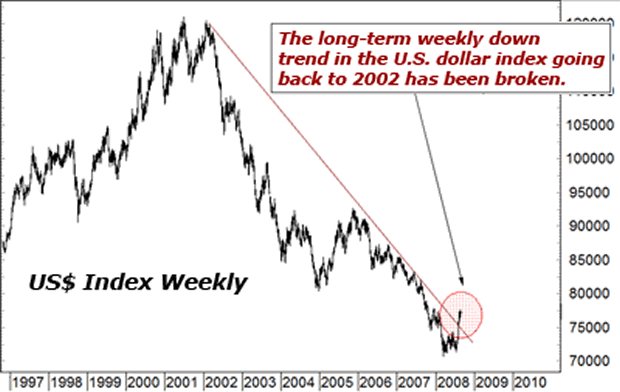Can Exports Save US Economy from Recession?
Economics / US Economy Sep 01, 2008 - 11:14 AM GMT Jack Crooks writes: Since the start of the U.S. housing downturn we've been told that consumers were in trouble. After the subprime market shakeout we were told our economy was in trouble. And after credit tightened up we were told to expect an inevitable U.S. recession.
Jack Crooks writes: Since the start of the U.S. housing downturn we've been told that consumers were in trouble. After the subprime market shakeout we were told our economy was in trouble. And after credit tightened up we were told to expect an inevitable U.S. recession.
But yet ... we're not in a recession. At least not technically speaking since that is defined as two quarters of negative GDP growth.
In fact, a preliminary report on U.S. GDP out earlier this week showed growth of 3.3% in the second quarter over the first quarter.
What's keeping this economy out of the recessionary frying pan? One word: exports.
The Export Market Has Kicked into High Gear ... Effectively Supporting the U.S. Economy
 |
| Exports to developing countries in Asia and Central American are zooming! |
The U.S. dollar's fall to record lows as recently as mid-March has helped make U.S. exports more affordable this year. And the obvious conclusion to draw is: Now that the U.S. dollar is appreciating, U.S. exports should begin to taper off in lock-step.
But the composition of U.S. exports is changing ... for the better.
In the 6-month period ending in June of 2008, U.S. exports to Asian and Central American countries jumped by 22.6% and 21.6%, respectively, from the similar period a year ago. And for the 12 months ending in June, U.S. exports to those regions rose faster than everyone's darling — China.
So what's behind the surge in U.S. exports to emerging markets in Asia and Central America? The simple reason is that many emerging markets are stepping up to become more industrialized economies and they're looking to the U.S. to provide the necessary capital goods.
That means demand for U.S. products isn't going to be squashed ... even if the U.S. dollar keeps strengthening .
Will Resilience, Productivity, and Optimism Prevail?
What about those who refuse to believe the U.S. economy is resilient and flexible enough to skirt recession?
Here's what Brian Wesbury, chief economist at First Trust, has to say about it:
"In response, the economy has remained resilient for a generation; overcoming without great difficulty threats like the 1987 stock market crash, the S&L crisis, the rapid decline of oil prices in the 1980s (think Texas), the rapid rise of oil prices in the 2000s (think almost everywhere else), 9/11, hurricanes Katrina and Rita, and the Asian Contagion, along with the collapse of Long-Term-Capital Management. Since 1982, the U.S. economy has been in recession just 5.2% of the time, versus 31% of the time between 1969 and 1982.
"This does not mean there is no economic pain. A high productivity economy will often generate problems for those whose skills are becoming obsolete. A skill acquired by age 20 or 25 is no longer going to last a lifetime when the world is changing so rapidly. It might not even last a decade. And companies face competition from new entrants using radically different technology (think traditional newspaper classified ads versus Craigslist). This forces businesses to work harder at squeezing out operational inefficiencies, potentially resulting in job losses, even during periods of strong economic growth.
"But year by year, and decade by decade, productivity growth is the key source of rising standards of living. It's what makes it possible for us to live longer and better than our parents; it's what makes it possible for our children to live longer and better than we do."
I agree. And recent polls support Mr. Wesbury's view. Indeed, respondents are revealing optimism when questioned about their individual situations.
While regular consumer sentiment surveys became slightly more optimistic in the most recently reported period, 76% of those Americans recently surveyed in a Quinnipiac University poll felt that their family's financial situation is either "holding steady" or "improving." Whereas that same poll showed 87% of respondents felt the nation's economy is either in "not-so-good" or "poor" condition.
Sure, consumer spending isn't where it was during the most recent economic boom. Sure, the employment situation has softened more than we'd like to see. And sure, foreclosures are steamrolling over the real estate market.
Maybe recession is a foregone conclusion.
But even if that's the case, the dollar is holding up rather well. The U.S. Dollar Index has broken above its weekly downtrend line going back more than six years.

And with oil prices pulling back and exports soaring, things are getting more interesting by the day. Is the buck anticipating a softer landing for the U.S. economy? Stay tuned ...
Best wishes,
Jack
This investment news is brought to you by Money and Markets . Money and Markets is a free daily investment newsletter from Martin D. Weiss and Weiss Research analysts offering the latest investing news and financial insights for the stock market, including tips and advice on investing in gold, energy and oil. Dr. Weiss is a leader in the fields of investing, interest rates, financial safety and economic forecasting. To view archives or subscribe, visit http://www.moneyandmarkets.com .
Money and Markets Archive |
© 2005-2022 http://www.MarketOracle.co.uk - The Market Oracle is a FREE Daily Financial Markets Analysis & Forecasting online publication.



